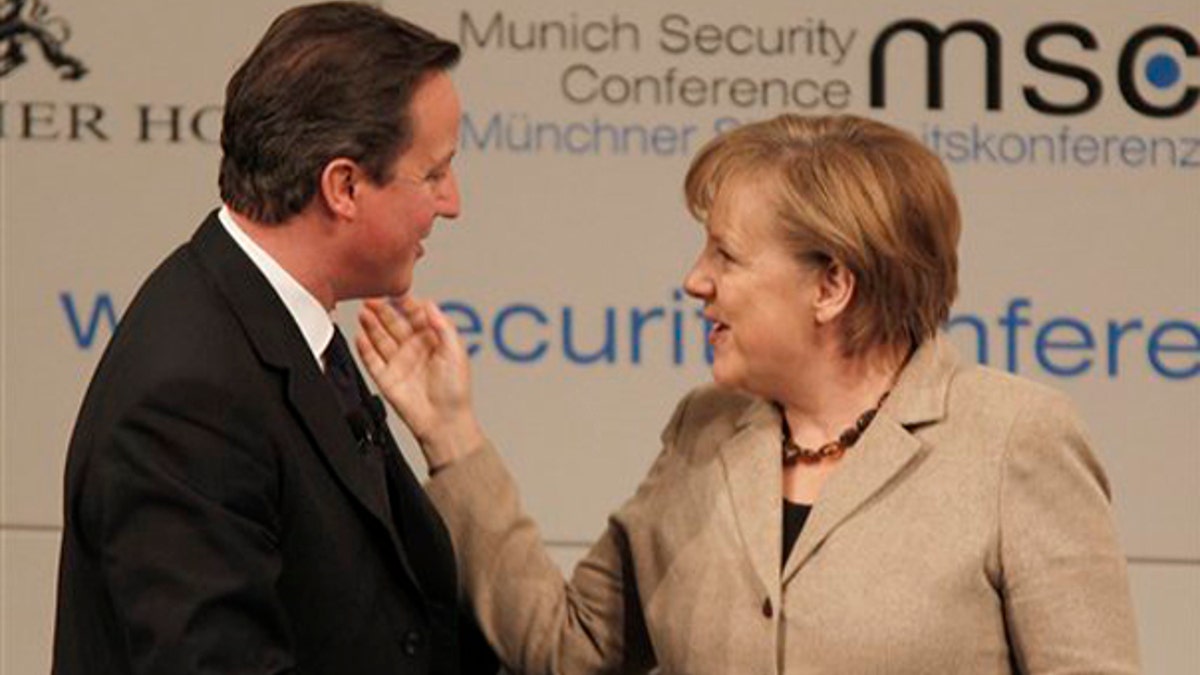
Saturday: British Prime Minister David Cameron chats with German Chancellor Angela Merkel after attending a panel discussion during the Conference on Security Policy in Munich, Germany. (AP)
British Prime Minister David Cameron has lashed out at multiculturalism, the second time a European leaders has done so recently. Following on the heels of German Chancellor Angela Merkel, Cameron implored the West to confront extremism now.
Cameron said last weekend that letting different cultural groups -- especially Muslims -- exist in separate communities divides the nation and is not only wrong but dangerous.
"We have encouraged different cultures to live separate lives," the center-right Cameron stated, "apart from each other and apart from the mainstream."
Cameron's concern is that separatism allows young people to be lured into extremism, saying "the biggest threat that we face comes from terrorist attacks, some of which are, sadly, carried out by our own citizens."
One leading authority on transatlantic relations says this mentality is a "fundamental rejection" of a widespread doctrine that has failed across Britain and Europe the past two decades.
"Islamic extremists have exploited this doctrine to advance their own anti-British agenda," explains Nile Gardiner of the Heritage Foundation
To maintain separate communities where a minority of young Muslims could be seduced by those preaching radicalism and drawn to violence such as the bombings in the London Underground that killed more than 50 in 2005 is dangerous Gardiner and Cameron agree.
"There are an estimated 3,000 Al Qaeda operatives in the U.K. alone," Gardiner says. "And British authorities have thwarted dozens of Islamist terrorist attacks on the U.K. in last few years alone."
Cameron argues such acts are enabled when Britain allows – and even excuses -- separate communities in which those preaching violence remain unseen. "We've failed to provide a vision of society to which they feel they want to belong," he says. "We've even tolerated these segregated communities behaving in ways that run completely counter to our values."
Those arguments are seconded by some American lawmakers.
"It's a careful balance," Sen. John McCain, R-Ariz., said. "Many of us would argue that we have erred on the side of being politically correct and risk 'bad publicity.'"
Cameron makes the same point this way: "So, when a white person holds objectionable views, racist views for instance, we rightly condemn them. But when equally unacceptable views or practices come from someone who isn't white, we've been too cautious frankly - frankly, even fearful - to stand up to them."
He points to things to which some have turned a blind eye-- "the failure, for instance, of some to confront the horrors of forced marriage, the practice where some young girls are bullied and sometimes taken abroad to marry someone when they don't want to, is a case in point. This hands-off tolerance has only served to reinforce the sense that not enough is shared. And this all leaves some young Muslims feeling rootless."
But Cameron is careful to emphasize that Islam as a whole is a peaceful religion practiced by over a billion people.
"Islamist extremism is a political ideology supported by a minority... It is vital that we make this distinction between religion on the one hand and political ideology on the other."
